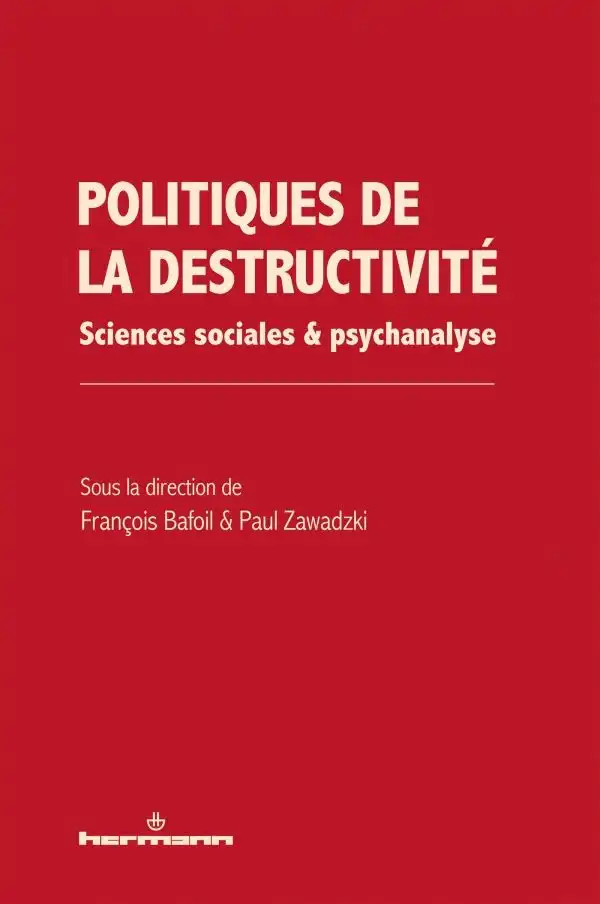Home>Renewing the Dialogue between the Social Sciences and Psychoanalysis.

12.06.2024
Renewing the Dialogue between the Social Sciences and Psychoanalysis.
Interview with François Bafoil and Paul Zawadzki
The result of three years of a regular seminar, Politiques de la destructivité, edited by François Bafoil and Paul Zawadzki, will be published by Hermann in June 2024. What kind of dialogue is possible between the social sciences and psychoanalysis, and on what issues? The editors of the book answer our questions about the ambitions of the seminar and the recently published book.
The book is based on a regular seminar you started at the CERI in 2021 with the aim of reconnecting the humanities and social sciences with psychoanalysis. Can you tell us how this seminar came about?
Despite the strong presence in public debate of themes such as memory, denial, and repression, and the renewed interest in authors such as Norbert Elias, who has never ceased to plough through the Freudian literature, we started from the observation that the thinking of the social sciences was not sufficiently linked to the psychic sciences, which is in a way surprising when one considers the contemporaneity of Sigmund Freud, Émile Durkheim, and Max Weber (born in 1856, 1858, and 1864 respectively). In fact, the debate between these disciplines has never been very harmonious, especially in France, where, as we recall in Politiques de la destructivité , Durkheimian sociology was established by sidelining the study of subjectivity. German sociology, for its part, was built on different epistemological premises, but, despite the fact that some of Max Weber’s texts are more nuanced on these issues than is generally acknowledged, comprehensive sociology stops at the gates of the Freudian unconscious. In France, however, the dialogue continued until the 1980s, enriching the work of historians (Michel de Certeau, Léon Poliakov, Alphonse Dupront, Saul Friedlander, etc.), sociologists, and anthropologists such as Roger Bastide and Georges Devereux, and political philosophers such as Cornelius Castoriadis. It was only later that the dialogue dried up.
Was it this drying up of the dialogue that convinced you to undertake this project?
In fact, we decided to revisit the social science/psychoanalysis “issue” without glossing over the epistemological difficulties that have already been highlighted by numerous authors in the past. Combining the postulate of the universality of the human psyche with historical singularity is far from self-evident. Psychoanalysts are sometimes tempted to apply Freudian theory to the field of socio-political experience, as if the terms “individual unconscious” and “collective unconscious” were interchangeable and “naturally” related; or to postulate the existence of an efficient “death drive” in the social field, without demonstrating it. Conversely, in political science or sociology, if we leave out the anthropological dimension, if we fail to understand the passionate or impulsive, delusional or fantastic dimension of a history as violent as that of the last century, we miss what we consider to be a fundamental dimension.
Let’s get to the heart of the matter: the barbarity that emerged from within European societies, which remains one of the most nagging questions long after the totalitarian moment. In his book La revanche des passions (The Revenge of Passions), Pierre Hassner likes to recall Raymond Aron’s famous dictum that “those who believe that peoples will follow their interests rather than their passions have understood nothing of the twentieth century”. This is the problem left to us by the great witnesses of the twentieth century: Freud and other psychoanalysts, the constellation of the Frankfurt School, and exiled authors such as Eric Voegelin, Ernst Cassirer, and Hannah Arendt. But even on the Durkheimian side, we might recall Marcel Mauss’s famous letter of 6 November 1936: “That great modern societies, more or less out of the Middle Ages, can be suggested as Australians are by their dances, and set in motion like a round of children, is something that deep down we had not foreseen. This return to the primitive was not part of our thinking”.(1)
Just as it is not certain that we have taken the measure of the explosion of impulsive and sacrificial violence that accompanied the twentieth century, it is not certain that we are sufficiently aware of the dimension of hatred that seems to be making a comeback in contemporary societies. We cannot think of it only in terms of the categories of rationalisation or disenchantment with the world. We need only think of the rifts in contemporary American society, the logic of latent civil war that runs through certain Eastern European societies, or the resurgence of anti-Semitic hatred in France and England. The violence that emerges can in no way be reduced to its strategic or instrumental dimensions. Whether we use the concepts of death drive, barbarism, or destructiveness, we must give ourselves the intellectual means to understand them. This opens up the most difficult and interesting question for research: how can we work on the link between the historical and the psychic, taking both dimensions seriously?
In this respect, what is the relevance of the concept of habitus, which has been explored as much by Max Weber as by Norbert Elias and Pierre Bourdieu, but without any clear recognition of the impulsive dimension? What support does the Freudian hypothesis of the permanence of murder in history give us, and, in this sense, what value can we attach to the myth of origins? That of the horde and the murder of the father for the psychoanalyst? Or Thomas Hobbes’s myth of the war of all against all and the ever-present conflict? How does the ego relate to institutions in different political and social configurations? Wouldn’t this give us a solid basis for thinking about alienation or voluntary servitude, about the illusions to which we have consented, and with them those of the individual as well as those of the masses and their collective fallacies, whose particular translations historians try to follow, each time taking as their object the infinite variety of human constructs? A final question: how can we believe that institutions can ever eradicate the irrepressible violence of instincts that often gave rise to them?
Which of the issues discussed at the seminar are covered in the book?

The book is divided into two complementary parts, each with a different approach.
The first brings together the contributions of Paul-Laurent Assoun, François Bafoil, Abram de Swaan, Paul Luciani, Paul Zawadzki, and Claudine Haroche. It focuses on a series of Freudian categories (mass, repetition, denial, etc.) and their critical re-examination, whether by other disciplines such as anthropology (with the question of the value of the Oedipus complex when confronted with cultures other than the patrilineal, Aryan family that produced it, as the anthropologist Bronislaw Malinowski rightly points out), or by other currents that have emerged from within the psychoanalytic tradition itself, but which distance themselves considerably from certain aspects of Freudian anthropology; we are thinking here of the work of Erich Fromm.
The second part seeks to confront the various legacies of the psychoanalytic tradition with the socio-historical experience of traumatic violence in war, wartime rape, and nationalist delusions (see the chapters by François Bafoil, Julia Laureau, and Paul Zawadzki). This time, the aim is to raise the question of the modalities and thresholds that make use of psychoanalytic tools operative in the field of political study.
At the interface between the first and second parts of the book, we find a fine example of a fruitful dialogue between a historian of wartime violence (Annette Becker) and a psychoanalyst (Françoise Davoine), who for a long time taught a seminar on “Madness and the Social Bond” (“folie et lien social”) at the EHESS and who, in her clinical practice, was keen to develop the link between “history and its great axe” and the methods of clinical work best suited to this type of psychological suffering.
What follow-up do you intend to give to the book and the seminar?
We have not taken up some of the key themes of the seminar in the book. We’re thinking in particular of religious issues. We intend to return to this during the 2024-2025 academic year: several sessions on religious civil wars are already planned. More broadly, next year, we will explore the question of feminicide, lynching, and the barbaric figures that tear apart the political and social fabric, leading to sudden explosions of violence and cruelty for which the social sciences often have no words.
In choosing the phenomenon of war as the theme for this year’s seminar, we are continuing the work of previous years, which has sought to find ways of combining the reciprocal and interdisciplinary contributions of political, socio-historical, and psychoanalytical approaches. The aim is neither to analyse historical configurations of war directly, nor to study violence as the simple effects of the destructive impulse, as an anthropological invariant, but rather to explore how taking into account the field of affects and impulses contributes to the analysis of the phenomena of war violence.
We will look at the categories used in these different disciplines: repetition and re-presentation, forgetting and repression, negation or denial, hatred, love and barbarism, pleasure and indifference, the imaginary, fantasy and surreality, latency and memory; and finally, the relevance of the category of the death drive, always taking care to consider it as a hypothesis and not as a postulate.
This shows how urgent it is for us to renew the dialogue with those in the field of psychoanalysis—and there are many—who are developing a rich body of thought on hatred and psychic collapse that mirrors social and environmental collapse.
Interview by Miriam Périer, CERI.
- Find out the presentation of the book on the publisher’s website
- Find out more about the seminar
- Listen to the audio recordings of all the sessions of the seminar
Illustration: A sheperd walking in front of his flock, circa 1918. Everett collection for Shutterstock
Notes
- 1.« Lettre de Mauss à Svend Ranulf », in Marcel Fournier, Marcel Mauss, Paris, Fayard, 1994, p. 690. Our translation.
(credits: Everett collection for Shutterstock)
Follow us
Contact us
Media Contact
Coralie Meyer
Phone : +33 (0)1 58 71 70 85
coralie.meyer@sciencespo.fr
Corinne Deloy
Phone : +33 (0)1 58 71 70 68
corinne.deloy@sciencespo.fr
